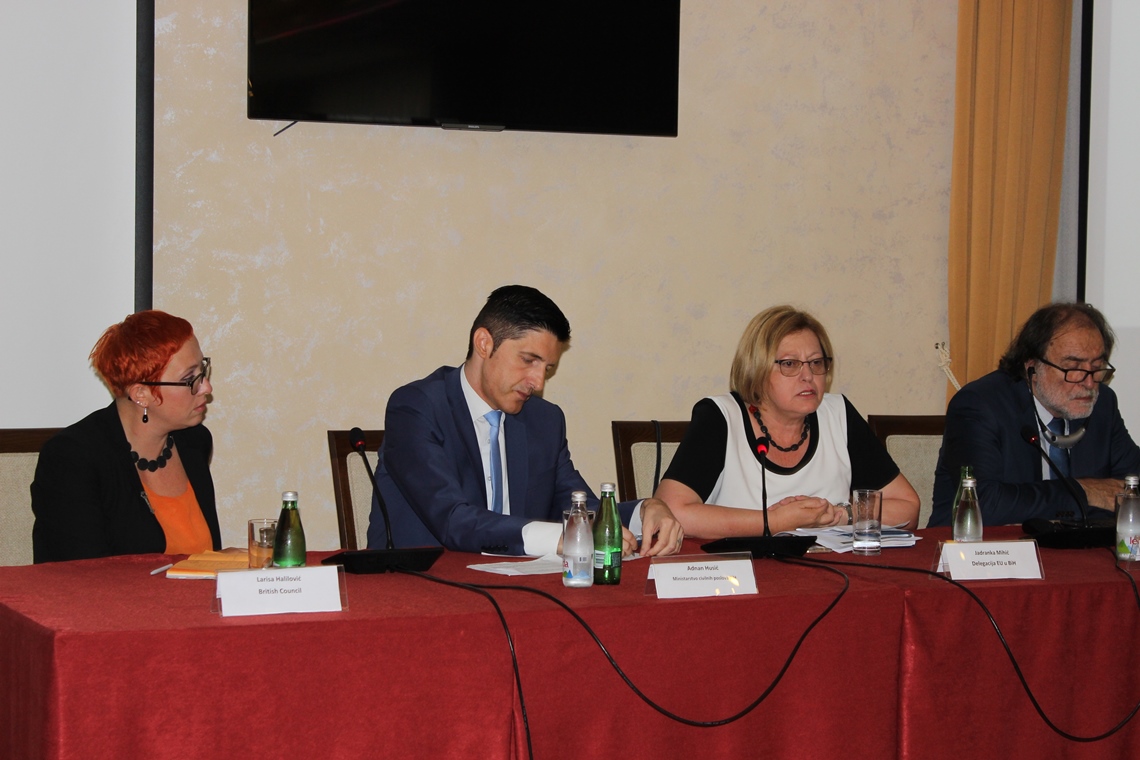“Children have the right to quality education and it is up to governments to fulfil their ultimate responsibility as duty-bearers in guaranteeing the right to quality education: the broad participation and commitment by all actors concerned is crucial” was the overall conclusion of the conference held on 6 July in Mostar. The final Conference organised under the EU funded project “Development of a Qualifications Framework for General Education” aimed at presenting the project results and exchanging experience among various stakeholders. The project key objectives were to further develop elements of the BiH Qualifications Framework for general education and contribute to the comparability of education systems in BiH with education systems in the EU, based on the EU Strategy 2020.
The project included further development and piloting of learning outcomes and specified standards at the end of 3rd, 6th and 9th grades of primary education in mathematics, mother tongue, foreign languages and biology and at the end of secondary education, and production of a Quality Assurance Manual for General education, which will largely contribute to improvement of quality of this level of education.
Adnan Husic Assistant Minister in the BiH Ministry of Civil Affairs underlined the importance of the project for the improvement the education system in BiH. “New members of the European Union, candidates and potential candidate countries showed that development and implementation of the qualification framework could be a tool for reform and modernization of the overall education and training system, which should be based on the learning outcomes. This is an important step for BiH on its road to EU accession,” said Husic.
Jadranka Mihic Programme Manager within the EU Delegation to BiH underscored the importance of the education reform and referred to the project objectives. “The project was dealing with quite difficult and demanding topics going deeply in the education reform. The transformation of the education system from archaic input-based to the output-based system is crucial part of the education reform. We should focus on what should students know, be able to do and what their expected competencies are at the end of each level of education,” said Mihic.
More than 500 education sector professionals from across Bosnia and Herzegovina took part in 86 working meetings and workshops and shared their knowledge and expertise in order to develop the required documents and standards. Over 2000 professionals were consulted in the process, including teachers, professors, pedagogues, school directors, representatives of 50 Ministries, Agencies and Pedagogical Institutes and relevant public institutions.
“Implementing a range of measures will enhance the quality of general education in BiH and provide future generations of youngsters a perspective and improve their quality of life in a rapidly changing environment,” said Willem H. Kolthof, Team Leader of the project and emphasised: “A holistic approach is required: fragmented vision of education will lead to inconsistent, contradictory remedial interventions, with uneven and imbalanced improvements of aspects of quality”.
Larisa Halilovic, Director of the British Council in BiH, pointed out that over the past two and a half years Education Sector professionals from across BiH demonstrated their commitment to positive change in Education – when it comes to quality of learning and teaching. “18 experts from 10 countries worked closely with their counterparts in BiH in order to take the best from local and international practice, while strengthening capacities and networks within the country and with other countries of the region and the EU. This serves as a solid base for the next steps required for Education reform and better future of young people in BiH,” said Halilovic.
As highlighted during the conference today, quality education must be a priority from the early years of a child, as well as in the transition from childhood to adulthood.
Final conclusion of the conference was that good results were achieved, and there is no doubt that these results will represent an excellent foundation that will facilitate implementation of the Qualifications Framework. The results to date, as emphasised during the conference, include the development of a comprehensive roadmap for the implementation of External Matura, creation of Occupational Standards for Teachers in pre-primary, primary and secondary education, development of a set of training modules and guidelines for training of teachers in application of professional standards and development of professional competences.
The project “Development of a Qualifications Framework for General Education” was funded by the European Union in the amount of EUR 1.857.600 and implemented by the British Council in partnership with WYG and GIZ.




